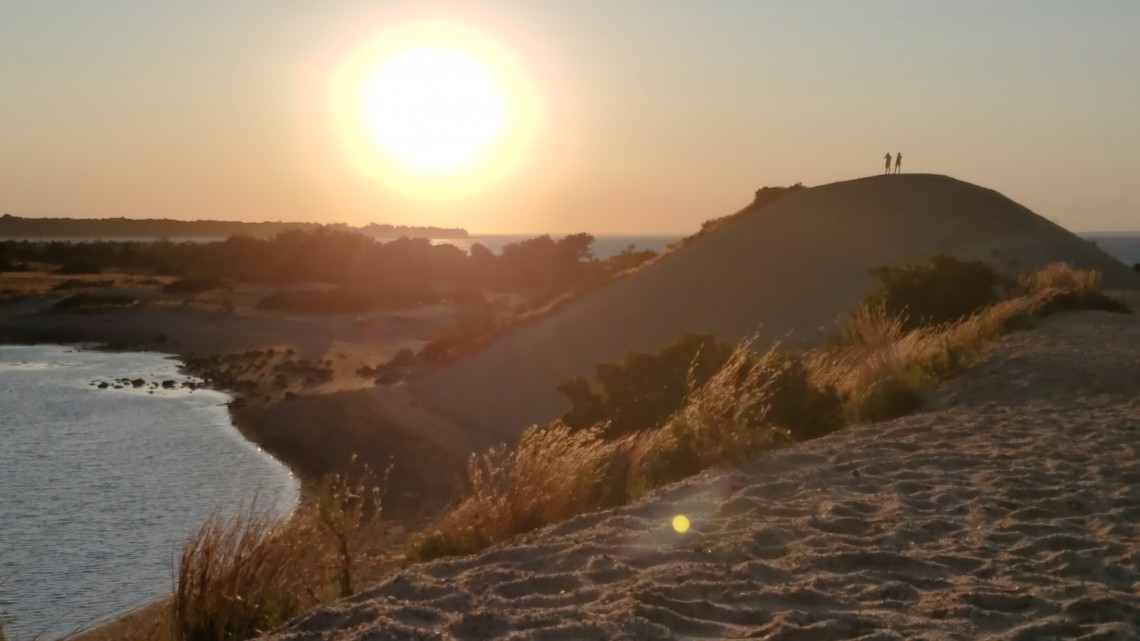
Sunset over Long Island Sound (McAllister Park, Port Jefferson, NY).
News directly from Cornell's colleges and centers
Four Specialists Join New York Sea Grant
By Kara Lynn Dunn
Four new extension specialists have joined New York Sea Grant (NYSG) in its mission of “Bringing Science to the Shore” as part of a collaborative program between Cornell and the State University of New York.
NYSG specialists work with faculty and researchers at Cornell, SUNY colleges and universities, and other academic institutes and agency partners in New York State to develop and provide integrated research, science, education, and extension services that address timely and high priority challenges and opportunities related to New York’s freshwater and marine environments, economies, and communities.
“New York Sea Grant resources are designed to make the latest science-based information available to help New York’s waterfront communities and citizens to strengthen coastal economies and quality of life,” says Cornell Cooperative Extension Assistant Director and NYSG Associate Director Katherine Bunting-Howarth, Ph.D., J.D.
Recently-hired Coastal Resilience Extension Specialist Katie Graziano (’11) works with communities, agencies, and academic partners on coastal management issues, including the impact of flooding. She recently shared details about her work on the “Extension Out Loud” podcast.
“As sea levels rise, New York Sea Grant research and extension will provide science-based insights to help those living with and adapting to chronic flooding,” says Graziano.
With New York’s potential to sustainably develop aquaculture—the managed cultivation of fish, crustaceans, mollusks, and aquatic plants—NYSG hired its first aquaculture specialist in September of 2020. Since joining the team, Emma Forbes has begun creating a professional network for N.Y.’s marine and Great Lakes aquaculture producers, wholesalers, researchers, regulators, economists, and others.
“Aquaculture producers in New York see a vibrant future for the managed cultivation of fish, crustaceans, mollusks, and aquatic plants, if they receive the right support,” says Forbes.
Wild fisheries are the forte of NYSG’s Great Lakes Fisheries and Ecosystem Health Specialist Stacy Furgal. Furgal develops public education materials, including a Great Lakes aquatic food web poster and a lake sturgeon intermediate level curriculum that incorporates data from a Cornell Department of Natural Resources lake sturgeon fish project.
“Our new Lake Sturgeon Intermediate Curriculum features the charismatic, prehistoric fish known as a ‘living fossil’ as a springboard into the world of science, environmental stewardship, and STEM-based careers for students. It also highlights fisheries as an important contributor to the economic health of New York State,” says Furgal, who gained prior research and technical experience with the New York State Department of Environmental Conservation, U.S. Fish and Wildlife Service, and U.S. Geological Survey.
NYSG’s new Great Lakes Coastal Literacy Specialist Nate Drag worked with staff from the American Indian and Indigenous Studies Program at Cornell to develop environmentally-themed reading lists for grades K-12. Drag uses the reading lists along with lake sturgeon resources, and a Freedom Seekers curriculum that highlights New York’s Underground Railroad history, in his “teach-the-teacher” training workshops.
“The teach-the-teacher workshops equip teachers to reach hundreds of students through the use of New York Sea Grant curricula, associated activities, and collateral materials designed to connect the educators, students, and the public to the unique environmental, ecological, cultural, historic, economic, recreational, and STEM career resources of the Great Lakes region,” says Drag.
Drag also coordinates New York’s Great Lakes Ecosystem Education Exchange, administered in partnership with the NYS Department of Environmental Conservation.
The NYSG extension team also includes specialists focused on seafood safety, Great Lakes and marine fisheries, aquaculture, Great Lakes marine and Hudson River Estuary coastal processes and hazards, Long Island Sound conservation and management, coastal community development, coastal recreation and tourism, and coastal education and literacy. New York’s Sea Grant is one of 34 university-based programs under the National Oceanic and Atmospheric Administration National Sea Grant College Program.
Kara Lynn Dunn is the publicist for New York Sea Grant Great Lakes and the Great Lakes Research Consortium.
Media Contact
Get Cornell news delivered right to your inbox.
Subscribe
